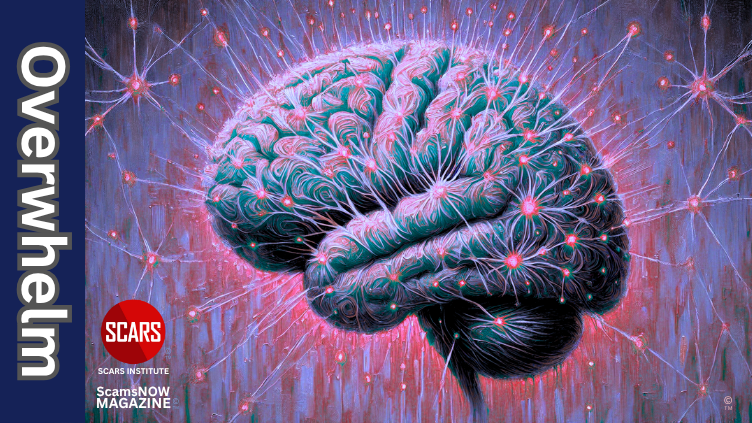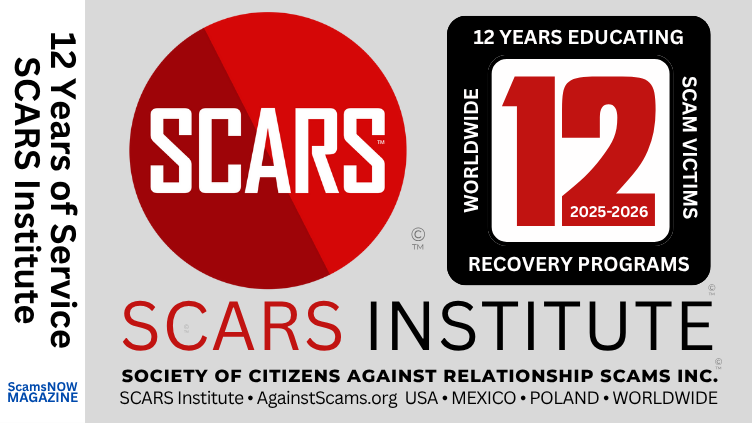
SCARS Institute – 12 Years of Service to Scam Victims & Survivors – 2025/2026
Authors:
• Vianey Gonzalez B.Sc(Psych) – Licensed Psychologist, Specialty in Crime Victim Trauma Therapy, Neuropsychologist, Certified Deception Professional, Psychology Advisory Panel & Director of the Society of Citizens Against Relationship Scams Inc.
• Tim McGuinness, Ph.D., DFin, MCPO, MAnth – Anthropologist, Scientist, Polymath, Director of the Society of Citizens Against Relationship Scams Inc.
• Debby Montgomery Johnson, President and CEO of BenfoComplete.com, Online Scam/Fraud Survivors Advocate, Author, Keynote Speaker, Trainer, Podcast Host, USAF Veteran, Chair and Director of the Society of Citizens Against Relationship Scams Inc.
• Janina Morcinek – Certified and Licensed Educator, European Regional Director of the Society of Citizens Against Relationship Scams Inc.
Author Biographies Below
About This Article
The SCARS Institute, marking its 12th year of service, has established itself as a global leader in supporting scam victims, offering a comprehensive suite of resources and programs. Founded as a nonprofit, the SCARS Institute provides advocacy, education, and psychological insights to aid victims in their recovery and rebuilding process. Through initiatives such as the Scam Survivor’s School, the SCARS Institute empowers victims with the knowledge and tools necessary to navigate their healing journey. The organization’s dedication to understanding the psychological impact of scams is evident in its Manual of Scam Psychology, a resource that guides both victims and advocates. The SCARS Institute also partners with global entities to enhance its mission and reach, ensuring that support and recovery services are accessible to victims worldwide. By fostering a sense of community and connection among survivors, the SCARS Institute recognizes the importance of social support in the healing process. As it looks to the future, the SCARS Institute remains committed to innovating, adapting, and expanding its efforts, driven by a deep commitment to the well-being and empowerment of scam victims.

The SCARS Institute at 12 Years: A Decade and Beyond of Dedication to Scam Victims and Survivors
As the SCARS Institute enters its 12th year of service, it stands as a beacon of hope and support for scam victims and survivors worldwide. Founded on the principles of advocacy, education, and psychological understanding, SCARS has been at the forefront of the fight against scams, fraud, and cybercrime, and the development of education and recovery pathways for scam victims. Their comprehensive approach to victim support and recovery through education has had a significant impact on over 12 million lives, offering a roadmap for healing and resilience in the face of betrayal and deception.
A Legacy of Advocacy and Support
From its inception, the SCARS Institute has been committed to advocating for the rights and well-being of scam victims. Recognizing the unique challenges and traumas faced by those who have fallen prey to scams, SCARS has worked tirelessly to raise awareness, challenge stigmas, and promote policies that protect and support victims. Their advocacy efforts have been instrumental in shaping the global conversation around scam victimization, highlighting the need for compassion, understanding, and effective support systems.
One of the cornerstones of the SCARS Institute’s advocacy work is its dedication to providing real knowledge and help to victims. Through their website www.ScamVictimsSupport.org, the SCARS Institute offers a wealth of resources, including articles, guides, and support knowledge, designed to empower victims with the information they need to navigate the complexities of recovery. This commitment to education and support is a testament to the SCARS Institute’s unwavering dedication to the well-being of scam victims.
Pioneering the Psychology of Scams
Understanding all of the psychological aspects of scams is crucial for effective victim support and recovery. The SCARS Institute has been at the forefront of this understanding, developing its ‘Manual of Scam Psychology,’ available at www.ScamPsychology.org. This comprehensive resource explains the intricacies of scam psychology, both from the perspective of the criminals’ use of psychological tactics to manipulate and control their victims, as well as the vulnerabilities they exploit, and the emotional and psychological impacts on victims.
The Manual of Scam Psychology is more than just a theoretical exploration; it is a practical tool for victims, survivors, advocates, professionals, and law enforcement. By providing deep insights into the psychological mechanisms at play, the SCARS Institute empowers individuals to recognize the signs of manipulation, understand victim responses, and develop strategies for support, healing, and resilience. This psychological framework is a vital component of the SCARS Institute’s holistic approach to victim support through education.
Educational Initiatives and Community Building
Education is the key pillar of the SCARS Institute’s mission, and its educational initiatives have reached over 12 million individuals worldwide. Through platforms like www.SCARSeducation.org, it offers its free Scam Survivor’s School, and with www.RomanceScamsNOW.com and www.ScamsNOW.com, the SCARS Institute offers a range of educational resources, including courses, webinars, and podcasts, and more, designed to inform and empower victims and survivors.
The SCARS Institute’s free Scam Survivor’s School, available at www.SCARSeducation.org, is a flagship program that provides in-depth education and support for scam survivors. The school offers a structured curriculum that covers everything from the basics of scam awareness to advanced topics in psychological recovery and advocacy. This educational initiative is a testament to the SCARS Institute’s commitment to equipping survivors and their families with the knowledge and skills they need to rebuild their lives.
In addition to formal education, the SCARS Institute creates a sense of community and connection among scam survivors. Through platforms like www.ScamSurvivorStories.org, survivors can share their stories, connect with others who have gone through similar experiences, and find support and encouragement. This community-building effort is a crucial aspect of the SCARS Institute’s work, as it recognizes the importance of social support in the healing process.
Reporting and Justice
Reporting scams and bringing criminals to justice is a critical component of SCARS’ mission. Through their reporting platform at www.AnyScam.com and additional reporting information at reporting.AgainstScams.org, the SCARS Institute encourages all scam victims to report scams and contribute to the fight against cybercrime. This platform is designed to ensure that victims’ data is protected and never shared with anyone other than law enforcement, and especially never with money recovery companies, maintaining the integrity and trust of the reporting process.
The SCARS Institute’s commitment to justice extends beyond reporting, as they work to raise awareness about the prevalence and impact of scams in Latin America, West Africa, and Asia. Through their YouTube channel, the SCARS Institute shares podcasts, webinars, and helpful videos that educate the public about the realities of scams and the importance of vigilance and reporting, as well as provide self-help support.
Honoring Survivor Stories and Advocacy
The stories of scam survivors are a powerful testament to the resilience and strength of the human spirit. The SCARS Institute recognizes the importance of honoring and sharing these stories, as they provide inspiration, validation, and hope for others who are on the path to recovery. Through www.ScamSurvivorStories.org, the SCARS Institute offers a platform for survivors to share their experiences, connect with others, and find a sense of community and belonging.
For those who wish to take their advocacy to the next level, the SCARS Institute provides resources, training, and support for victims’ advocates through www.ScamVictimsAdvocates.org. This platform equips advocates with the knowledge, skills, and tools they need to make a difference in the lives of scam victims, promoting awareness, education, and policy change.
Global Impact and Partnerships
The SCARS Institute’s impact extends far beyond its educational and advocacy efforts. The organization has formed strategic partnerships with global entities to enhance its mission and reach.
Moreover, the SCARS Institute has been recognized and awarded for its educational contributions, providing generalized self-help information that individuals can use to achieve their goals related to emotional and psychological trauma recovery and management. This recognition underscores the organization’s commitment to empowering victims with the tools they need to navigate their recovery journey.
Innovative Programs and Resources
The SCARS Institute continues to innovate and expand its offerings to better serve scam victims and survivors. Remember that all SCARS Institute services for scam victims and their families are always free of any cost.
Additionally, SCARS offers a range of resources, including the SCARS Institute Journal of Scam Victims’ Advocacy, Support and Recovery Providers, which provides in-depth insights and research on the experiences and needs of scam victims. This journal is a testament to SCARS’ commitment to advancing the understanding of scam psychology and recovery.
Looking Ahead: A Future of Hope and Resilience
As the SCARS Institute enters its 12th year of service, it looks ahead to a future filled with hope and resilience. Their dedication to understanding the scam victim’s experience, mapping the course for recovery, and advocating for justice and support has made a profound impact on the lives of countless individuals. Through their comprehensive approach to education, psychology, and community building, the SCARS Institute continues to be a leading voice in the fight against scams and a beacon of hope for victims and survivors worldwide.
In the years to come, SCARS will continue to innovate, adapt, and expand its efforts, driven by a deep commitment to the well-being and empowerment of scam victims. Their work is a testament to the power of compassion, understanding, and collective action in the face of adversity, and a reminder that even in the darkest of times, there is always a path to healing and resilience.
About the SCARS Institute
The SCARS Institute is a nonprofit organization, incorporated as the Society of Citizens Against Relationship Scams Inc., in the state of Florida, USA. The Institute is self-funded and does not accept government grants nor donations from scam victims. It is based in Miami, Florida, with footprints in Monterrey, NL, Mexico, Poland, and Japan. It also has partners around the world, all working to better serve scam victims/survivors. The SCARS Institute is also partnered with BetterHelp.com to make it possible for scam victims to get the professional support they need at the lowest possible cost worldwide – SCARS receives no commissions from this effort.
The SCARS Institute is led by its chairwoman, Debby Montgomery Johnson, and its managing director, Prof. Tim McGuinness, Ph.D. Its board of directors also includes Lic. Vianey Gonzalez (a licensed psychologist – Mexico), Janina Morcinek (a licensed educator – Poland), and Rika Takebe (a principal of NPO Charms – Japan).
Additional SCARS Institute Services and Resources
♦ If you are a victim of scams, go to www.ScamVictimsSupport.org for real knowledge and help
♦ Enroll in SCARS Scam Survivor’s School now, at www.SCARSeducation.org
♦ To report criminals, visit https://reporting.AgainstScams.org – we will NEVER give your data to money recovery companies like some do!
♦ Follow us and find our podcasts, webinars, and helpful videos on YouTube: https://www.youtube.com/@RomancescamsNowcom
♦ Learn about the Psychology of Scams at www.ScamPsychology.org
♦ Dig deeper into the reality of scams, fraud, and cybercrime at www.ScamsNOW.com and www.RomanceScamsNOW.com
♦ Scam Survivor’s Stories: www.ScamSurvivorStories.org
♦ For Scam Victim Advocates visit www.ScamVictimsAdvocates.org
♦ See more scammer photos on www.ScammerPhotos.com

Author Biographies
-/ 30 /-
What do you think about this?
Please share your thoughts in a comment below!
2 Comments
Leave A Comment
TABLE OF CONTENTS
- The SCARS Institute at 12 Years: A Decade and Beyond of Dedication to Scam Victims and Survivors
- A Legacy of Advocacy and Support
- Pioneering the Psychology of Scams
- Educational Initiatives and Community Building
- Reporting and Justice
- Honoring Survivor Stories and Advocacy
- Global Impact and Partnerships
- Innovative Programs and Resources
- Looking Ahead: A Future of Hope and Resilience
- About the SCARS Institute
- Additional SCARS Institute Services and Resources
CATEGORIES
![NavyLogo@4x-81[1] SCARS Institute - 12 Years of Service to Scam Victims & Survivors - 2025/2026](https://scamsnow.com/wp-content/uploads/2025/04/NavyLogo@4x-811.png)
ARTICLE META
Important Information for New Scam Victims
- Please visit www.ScamVictimsSupport.org – a SCARS Website for New Scam Victims & Sextortion Victims.
- SCARS Institute now offers its free, safe, and private Scam Survivor’s Support Community at www.SCARScommunity.org – this is not on a social media platform, it is our own safe & secure platform created by the SCARS Institute especially for scam victims & survivors.
- SCARS Institute now offers a free recovery learning program at www.SCARSeducation.org.
- Please visit www.ScamPsychology.org – to more fully understand the psychological concepts involved in scams and scam victim recovery.
If you are looking for local trauma counselors, please visit counseling.AgainstScams.org
If you need to speak with someone now, you can dial 988 or find phone numbers for crisis hotlines all around the world here: www.opencounseling.com/suicide-hotlines
Statement About Victim Blaming
Some of our articles discuss various aspects of victims. This is both about better understanding victims (the science of victimology) and their behaviors and psychology. This helps us to educate victims/survivors about why these crimes happened and not to blame themselves, better develop recovery programs, and help victims avoid scams in the future. At times, this may sound like blaming the victim, but it does not blame scam victims; we are simply explaining the hows and whys of the experience victims have.
These articles, about the Psychology of Scams or Victim Psychology – meaning that all humans have psychological or cognitive characteristics in common that can either be exploited or work against us – help us all to understand the unique challenges victims face before, during, and after scams, fraud, or cybercrimes. These sometimes talk about some of the vulnerabilities the scammers exploit. Victims rarely have control of them or are even aware of them, until something like a scam happens, and then they can learn how their mind works and how to overcome these mechanisms.
Articles like these help victims and others understand these processes and how to help prevent them from being exploited again or to help them recover more easily by understanding their post-scam behaviors. Learn more about the Psychology of Scams at www.ScamPsychology.org
SCARS INSTITUTE RESOURCES:
If You Have Been Victimized By A Scam Or Cybercrime
♦ If you are a victim of scams, go to www.ScamVictimsSupport.org for real knowledge and help
♦ SCARS Institute now offers its free, safe, and private Scam Survivor’s Support Community at www.SCARScommunity.org/register – this is not on a social media platform, it is our own safe & secure platform created by the SCARS Institute especially for scam victims & survivors.
♦ Enroll in SCARS Scam Survivor’s School now at www.SCARSeducation.org
♦ To report criminals, visit https://reporting.AgainstScams.org – we will NEVER give your data to money recovery companies like some do!
♦ Follow us and find our podcasts, webinars, and helpful videos on YouTube: https://www.youtube.com/@RomancescamsNowcom
♦ Learn about the Psychology of Scams at www.ScamPsychology.org
♦ Dig deeper into the reality of scams, fraud, and cybercrime at www.ScamsNOW.com and www.RomanceScamsNOW.com
♦ Scam Survivor’s Stories: www.ScamSurvivorStories.org
♦ For Scam Victim Advocates visit www.ScamVictimsAdvocates.org
♦ See more scammer photos on www.ScammerPhotos.com
You can also find the SCARS Institute’s knowledge and information on Facebook, Instagram, X, LinkedIn, and TruthSocial
Psychology Disclaimer:
All articles about psychology and the human brain on this website are for information & education only
The information provided in this and other SCARS articles are intended for educational and self-help purposes only and should not be construed as a substitute for professional therapy or counseling.
Note about Mindfulness: Mindfulness practices have the potential to create psychological distress for some individuals. Please consult a mental health professional or experienced meditation instructor for guidance should you encounter difficulties.
While any self-help techniques outlined herein may be beneficial for scam victims seeking to recover from their experience and move towards recovery, it is important to consult with a qualified mental health professional before initiating any course of action. Each individual’s experience and needs are unique, and what works for one person may not be suitable for another.
Additionally, any approach may not be appropriate for individuals with certain pre-existing mental health conditions or trauma histories. It is advisable to seek guidance from a licensed therapist or counselor who can provide personalized support, guidance, and treatment tailored to your specific needs.
If you are experiencing significant distress or emotional difficulties related to a scam or other traumatic event, please consult your doctor or mental health provider for appropriate care and support.
Also read our SCARS Institute Statement about Professional Care for Scam Victims – click here
If you are in crisis, feeling desperate, or in despair, please call 988 or your local crisis hotline – international numbers here.
More ScamsNOW.com Articles
A Question of Trust
At the SCARS Institute, we invite you to do your own research on the topics we speak about and publish. Our team investigates the subject being discussed, especially when it comes to understanding the scam victims-survivors’ experience. You can do Google searches, but in many cases, you will have to wade through scientific papers and studies. However, remember that biases and perspectives matter and influence the outcome. Regardless, we encourage you to explore these topics as thoroughly as you can for your own awareness.
























![scars-institute[1] SCARS Institute - 12 Years of Service to Scam Victims & Survivors - 2025/2026](https://scamsnow.com/wp-content/uploads/2025/04/scars-institute1.png)

![niprc1.png1_-150×1501-1[1] SCARS Institute - 12 Years of Service to Scam Victims & Survivors - 2025/2026](https://scamsnow.com/wp-content/uploads/2025/04/niprc1.png1_-150x1501-11.webp)
If it weren’t for SCARS… I wouldn’t be able to proudly say today, like many other victims of fraud: I am a survivor / I am a thriver. The SCARS support group, regular Zoom meetings, easy access to SCARS’ rich resources, the systematic knowledge gained at SCAM SURVIVOR’S SCHOOL, and participation in courses offered by SCARS have helped me recover, rebuild my life after the scam, and now, as a SCARS volunteer help other scam victims recover. Many thanks to Dr. Tim, founder of the SCARS Institute, for his tremendous commitment and tireless work on behalf of fraud victims. A huge thank you to the entire SCARS team.
We thank you for your services as a volunteer and member of our Board of Directors too!